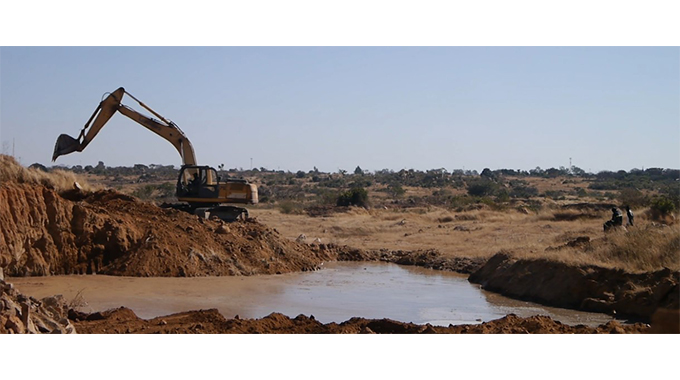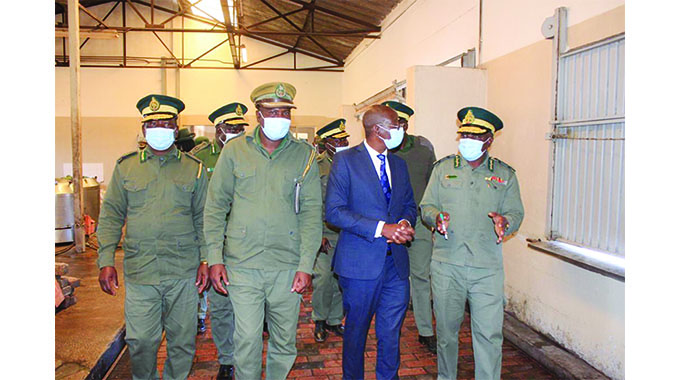BCC fills up death pits

Michelle Nyanzira, Chronicle Reporter
BULAWAYO City Council (BCC) has allocated US$200 000 to rehabilitate open pits which were left open over the years during infrastructural construction and those dug by sand poachers harming the environment and creating death traps especially for children.
In February, a 15-year-old Pelandaba West boy drowned in an abandoned pit.
The pits have also been a breeding ground for mosquitoes.
This came out during the Environmental Management Agency (Ema) media tour to spotlight solid waste management and ecosystem protection in Bulawayo.
BCC Roads Operations Engineer Mr Lookout Ndlovu said all pits will be rehabilitated to restore the environment and prevent accidents that have been happening.
“We are rehabilitating gravel pits where we used to get material for infrastructure development like housing and road construction to develop the city. We are now filling up the pits that are deep so that water can flow to nearby streams and not collect.
“We have been doing this programme since early this year and we are using spoil material that was left when we excavated the land to cover the pits. The rehabilitation of Pumula started in May and progress is about 15 percent,” he said.
Mr Ndlovu said rehabilitation of the Pelandaba site which was over four hectares big where the drowning incident happened has been successfully rehabilitated.
He said BCC has mapped all the open pits in the city using the Geographic Information System with all of them earmarked for rehabilitation so that the land is put to productive use.
Speaking at the same occasion, another BCC official Mrs Sehlile Ndlovu said once the land has been rehabilitated, it can be used for recreation purposes. “The extraction of gravel is a necessity even though it causes land degradation for road rehabilitation. As town planning, we demarcate several sites such that when a site gets decommissioned, it should be rehabilitated so that we move to the next for gravel extraction,” she said.
Environmental protection officer Mr Sobhuku Dube said the city has opened two sites in Mazwi Village in Khami and Luveve where people can buy sand legally.
“We conduct educational campaigns all over the city to ensure that land is protected and people collect sand from registered sites. To completely restore the area we need vegetation, so we are encouraging the residents to restore the degraded area where they see the need,” said Mrs Ndlovu.
Ema Bulawayo Provincial Manager Mrs Sithembisiwe Ndlovu said there is need for stakeholders to come together to end the problem of illegal sand poachers and illegal mining.
“We have a problem of illegal mining and illegal poachers and the impact is land degradation, but we are saying yes we have the problem but what are we doing? This is what the city is doing in terms of ecosystem restoration. We encourage all the players, all institutions and residents to focus on ecosystem restoration,” she said.
The media also visited a plastic recycling plant done by Chasdiel Investments where they were taken through the process of plastic recycling.
Mrs Ndlovu said waste recycling is an important process which creates employment as well as increases the lifespan of landfills.
“If we manage to separate our waste and recycle what is recyclable, we will reduce the amount of waste that is being dumped into the environment as it will be brought here for recycling and extends the lifespan of our landfills,” she said.
BCC Cleansing Superintendent Mr Nkanyiso Ndlovu said the community refuse removal project where council involves trucks from community members to collect refuse is paying dividends as it has seen the city reducing its costs.
He said the city now uses few of its refuse compactors which just wait for refuse to be delivered by the community trucks at pick up points before delivering at the landfill.
BCC corporate communication manager Mrs Nesisa Mpofu said they are extending the programme to all areas in the city.
“The city has invited members of the community that own trucks that range between 3 to 7 tonnes to submit expressions of interest to the city for residential areas in the low-density areas and other high-density areas such as Nguboyenja, Barboufields, Makokoba and Mzilikazi.
We want to roll out the programme to all areas of the city. The city compactors will focus on the CBD and institutions,” she said. — @michieroxy.











Comments